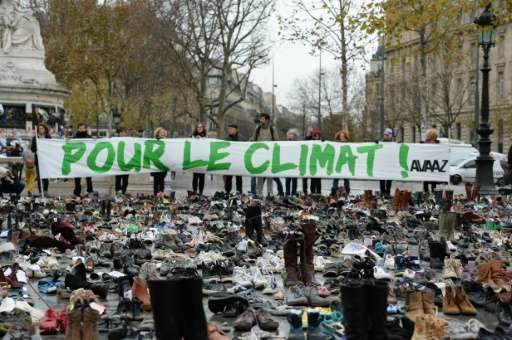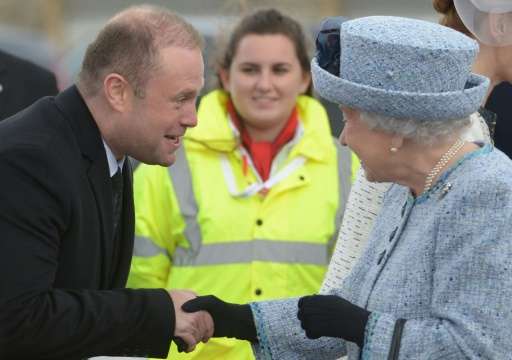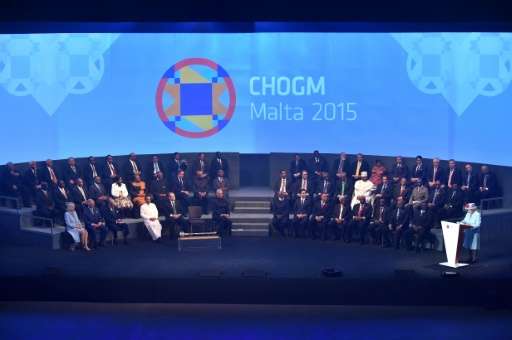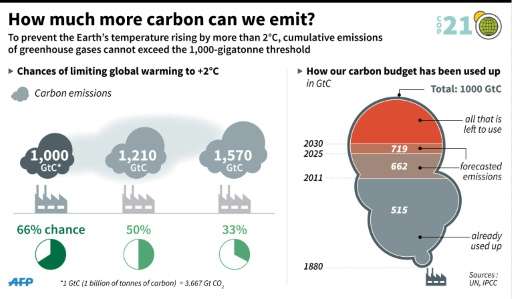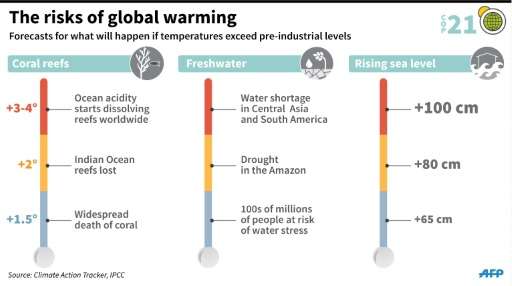The Place de la Republique in Paris, covered by hundreds of pairs of shoes on November 29, 2015 in a climate rally, one way to get around the ban on public gatherings after the terror attacks
The Commonwealth climate change agreement has made a deal at the upcoming Paris COP21 talks more likely, the 53-country organisation said Sunday, though one country expressed reservations over parts of the accord.
"The fact that we have achieved convergence and near unanimity on a very focused statement on climate change puts the possibility of a success at COP21 in better shape," Maltese Prime Minister Joseph Muscat, the Commonwealth summit host, said at the close of a three-day gathering on the Mediterranean island.
Heads of government from the Commonwealth family, which represents around a third of the world's population, on Saturday pledged to demand an "ambitious" and legally-binding outcome from the world climate change summit in Paris, which officially starts on Monday.
But "there were reservations expressed... by one country" over parts of three paragraphs in the agreement, the statement said. Officials were being tight-lipped about who had dragged their feet over the deal, or which parts of the paragraphs had raised concerns.
'Deeply concerned'
Though global warming topped the agenda at the Malta summit, world leaders also tackled the hot-button issues of extremism, corruption and migration.
The Commonwealth said it was "deeply concerned" about the disproportionate threat from an ever-hotter planet to its most vulnerable members.
It launched a Climate Finance Access Hub aimed at smaller island states that want to get access to funds to mitigate against the effects of climate change. Australia, Britain and Canada pledged billions of dollars (euros) to help the Commonwealth's weaker members.
Queen Elizabeth II (R) is welcomed by Malta's Prime Minister Joseph Muscat on her arrival on the island on November 26, 2015
"Climate change unites us, it puts us all in the same canoe. If a big wave comes, that canoe is going to be washed away with everyone in it," President Baron Waqa of Nauru warned at a closing press conference.
"It's a matter of life and death."
Freundel Stuart, the prime minister of Barbados, called on Paris attendees to wake up to the issue.
"If we don't reach a sensible agreement in Paris, we can all prepare for disaster," he said.
Because its membership includes industrialised G7 powers like Britain and Canada, and tiny island microstates such as the Maldives, agreement in the Commonwealth has historically boded well for deals being struck beyond its bounds.
Protect cherished values
Some 150 leaders were to attend the UN conference in Paris, tasked with reaching the first truly universal climate pact.
Queen Elizabeth II delivers a speech during the opening ceremony of the Commonwealth Heads of Government Meeting (CHOGM) at the Mediterranean Conference Centre in Valletta on November 27, 2015
The goal is to limit average global warming to two degrees Celsius (3.6 degrees Fahrenheit) over pre-Industrial Revolution levels by curbing fossil fuel emissions.
Small island members of the Commonwealth have insisted the two degree limit does not go far enough, and called repeatedly this weekend for a 1.5-degree cap to be adopted.
The Malta summit emphasised the link between global warming and migration, warning that "worsening impacts of climate change will increase climate-induced migration"—meaning wealthy nations would be increasingly affected by the fate of developing countries.
How much CO2 we have used up and what more we can use before global warming spirals out of control. 135 x 79 mm
There was a determination to "increase cooperation to defend and protect the values that we all cherish—democracy and good governance—against the threats that seek to roll them back like terrorism and climate change", Ghana's President John Mahama said.
In a bid to tackle the rise of violent extremism, the organisation said it was "imperative to counter the use of the Internet by extremist groups to radicalise and recruit fighters" and set up a new unit to try and prevent young people from becoming radicalised.
The leaders also discussed combating corruption—with British Prime Minister David Cameron insisting it was linked to radicalisation—and promised "enhanced transparency and collaboration among law enforcement bodies".
The impact on corals, freshwater and sea levels of a temperature rise of 1.5°C, 2°C and 3-4°C. (135 x 75 mm)
© 2015 AFP
